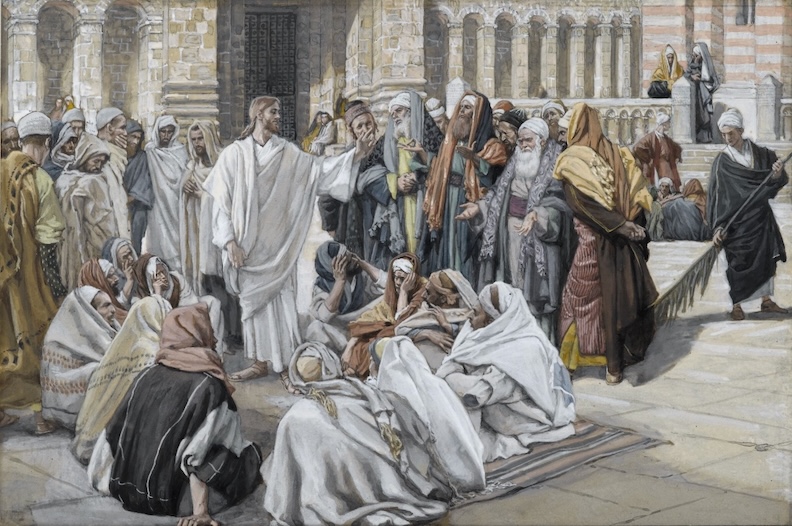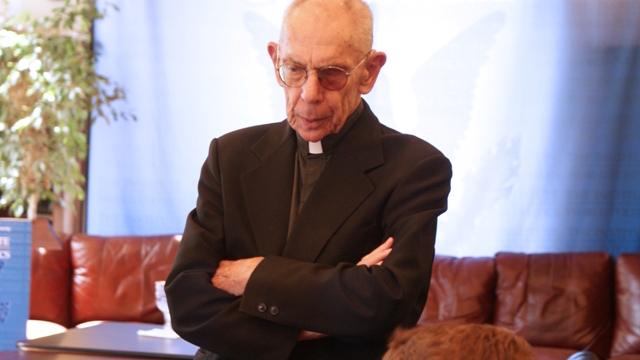Who Are You?
Fr. James V. Schall, S.J
At least four famous, not-often-enough-repeated Aristotelian questions can be asked of any given thing when we try to figure out what and why it is. They are: 1) “What is it?” – a tree, a rabbit, a planet? 2) “Is it?” That is, does it exist rather than not exist? Does it stand outside of nothingness? 3) Who or what put it into motion or into being? 4) “Why is it in existence?” What is the reason for which it now exists?
Of human beings, we can add a further question: “Who are you?” That is, each of us has a particular, singular, unrepeatable existence unlike any other being that ever existed, but we are still human. Each human “what” is a “you.”
We have a formal cause, a material cause, an efficient cause, and a final cause. We see that these different causes are needed to explain something real about what we encounter in the things that are.
We are not gods, nor do we blend into some “all” wherein we no longer exist in our singular identity. It is precisely the abidingness of our singular identity that is the most important thing about us. “I” am the one who did/did not do this or that. It is that singular, unique identity by which John is not Joseph, Suzie is not Sally, which enables us to identify the specific cause of things that come to pass in this world.
Every “you” can listen to another “you” and reply. Did you or did you not do this? In one sense, the history of the world passes through the choices of unique, particular human beings. Their choices and deeds make visible what and why they are.
The history of the world records the judgments, wise and unwise, made by the human persons who live in this world for however brief or long a time.
In the eighth chapter of John, Christ tells the Pharisees that He is going where they cannot find Him. Some think He is going to kill Himself. But Christ tells them that they will die in their own sins unless they believe that “I am.”
This same “I am,” the Pharisees suddenly recall, was a name that the Pharisees recognized. It was the one that Moses heard when he asked God His name.
In frustration, the Pharisees then logically ask: “Who are you then?” Needless to say, they are not prepared for His answer. Christ was speaking to them of His Father. He added that when they see Him raised up, they will then know that “I am.”
He does nothing of His own. He does what the Father taught Him. What He has heard He will “tell the world.” The one who sent Him is with Him. He only speaks of what is pleasing to the Father. Because He spoke with authority, many came to believe in Him. But most did not believe Him.
What is striking about these scenes is the puzzlement of the Pharisees. They have their own ideas about how some promised Messiah will appear among them. They are cagey and cautious. They are pretty sure that this person before them is a fake. They try their best to catch Him blaspheming.
But He always seems to be one step ahead of them. He makes pretty startling statements that seem to have legitimate foundations in their own traditions. He backs them up with what can only be called miracles. He identifies Himself with the Temple, with Jonah, with the Suffering Servant, and with someone greater than the Sabbath. They ask Him to explain Himself: “Who are you, then?”
In 1988, Joseph Ratzinger recalled the famous remark of the Dutch jurist, Hugo Grotius (d. 1645), to the effect that the natural law would be the natural law “even if” God did not exist. Of this affirmation, Ratzinger remarked: “But if God does not exist, nothing will be as it is now; everything will proceed from emptiness and revert to emptiness. What we call justice will be mere caprice that we can rewrite as we will.”
Things are as they are because they are created to be the way they are. They did not bring about their own existence. “Whether or not God exists, the answer to that question will ultimately determine whether or not we are human beings, whether human dignity and true humanity and human justice can or cannot exist.” (Co-Workers of the Truth)
The question of the Pharisees – “Who are you, then?” – is a proper one. If God does not exist, nothing will be as it exists now. Things will return to the nothingness out of which they emerged; only this time there would be no order in things, no one to ask: “But who are you?”
Christ is the one who holds things together. He is the Word of the Father.

Matter, Body, Soul, the Cross, and Easter
Joseph R. Wood
The problem of how soul and body fit together has elicited a lot of philosophical effort. Socrates, as reported by Plato, believed the soul to be separate from the body (a duality), existing before the body and after its demise.
He denounced the Homeric myths of the religion of Athens wherein the gods, in their bodies, do bad things.
But he didn’t reject all myth. For example, in Gorgias, Socrates concludes with a myth – which he repeatedly claims is not just a story but a “reasoned account” – telling of the soul’s judgment after death, decided by the choices of the soul while it was in the body. Socrates tells his friends their eternal fate depends on their accepting this myth, at least until they find something better.
Plato’s student Aristotle considered the soul the principle of life. In plants, the principle is nutritive: the plant seeks what it needs to thrive in soil, water, air and sunlight. In animal souls, sense perception is added to the nutritive capacities. In human souls, reason crowns the nutritive and sense faculties.
Aristotle held that the end or telos of being human, what it is to be fully human, is happiness, to which all else humans seek (money, fame, beauty) is thought to lead. But happiness, he argued, actually consists in the contemplation of the divine.
Happiness as contemplation, claims Aristotle, requires the cultivation of intellectual virtues, which rest on the moral virtues, habits of moderation and courage. But unlike most living things in nature, humans cannot usually reach this telos. We cannot be what we are meant to be.
Our intellect is the most divine thing in us, and a life of fully exercising the intellectual virtues of science and wisdom in contemplation is too divine for us.
Aristotle seems to say that the body, with its demands and wants, causes this dilemma. The moral virtues can help us master our bodies so that contemplation (for Aristotle, philosophy, or love of wisdom) might be occasionally possible, but not much more.
Aristotle brought the soul and body into a much closer relationship than Plato’s dualism. The soul gives form to the matter of a body in a particular plant, animal, or person. He seems doubtful about the idea that souls outlast bodies or could, like a sailor on a ship in port, exit the ship.
Msgr. Robert Sokolowski’s book, Introduction to Phenomenology makes a more modern case. Phenomenology began in the early 20th century, and sounds forbidding. But as Sokolowski explains, its strength lies in restoring the possibility – accepted by ancients like Plato and Aristotle – that we can truly know things that lie outside of our minds, things beyond our own ideas and thoughts.
The notion of the human mind isolated from its own body and from the world outside had come to prevail in philosophy over the last few centuries. It leaves us skeptical that we can know any reality that isn’t just some thought bouncing around inside our heads, or even whether there is such a reality.
Sokolowski writes that the soul, “bears an essential relation to the body and is founded on the body that it enlivens and determines and in which it is expressed. Human beings are animated bodies, not enmattered spirits.”
The body is not just a decoration or vehicle for a soul. And because it gives the matter of the body its human form, the soul together with the body is the human.
Sokolowski’s claim accords with Aristotle, and with Scripture. In one sense, the body comes first, so we can think of it as prior in time to the soul. In another sense, the soul takes priority over the body by giving it form.
Genesis 1 speaks of God’s creating inanimate things, then plants and animals, before creating man with a rational soul. Creation is fully what it is supposed to be – “very good” – when it is under rational man’s dominion.
Genesis 2 makes Sokolowski’s point even clearer: “God formed man of dust from the ground, and breathed into his nostrils the breath of life; and man became a living soul.” God created the body and then breathed spirit into it, thus a living soul.
In his collection of commentaries on the Gospels, Catena Aurea, St. Thomas Aquinas quotes the 8th century monk Alcuin on John 1:14, “And the word was made flesh.” Alcuin writes, “the incorporeal soul is joined to the body, so that [out] of two is made one man.” Commenting on the same verse, Cyril of Alexandria speaks of Christ “uniting to Himself a body of flesh animated with a rational soul,” and thus becoming truly human.
The long dispute about soul and body pushes us to think about yet another, preceding mystery. How did God, immaterial and unchanging, create matter at all? We accept it as flowing from God’s goodness and omnipotence. But can we understand how souls relate to bodies without understanding how matter was created by incorporeal Love in the first place?
After the Fall, God set a flaming sword to guard the tree of life and prevent man, now knowing good and evil, from living forever. I submit that the real task of the flaming sword is to prevent us from understanding fully, for now, the mysteries of matter, body. and soul. That understanding would be to live eternally.
God put the path to that knowledge, and to the full reconciliation of body and soul, through a piece of matter, specifically of wood. On Good Friday, we were called to enter the mysteries of body and soul, through the matter of the Cross.
Only with that faith in something material, something outside our heads, do we now begin to see Christ in the Resurrection, in Easter, divine body and soul.
__________
You may also enjoy:
The Catholic Thing friends and contributors In Praise of James V. Schall S.J.
. . . and, with Schall himself Schall at Ninety















